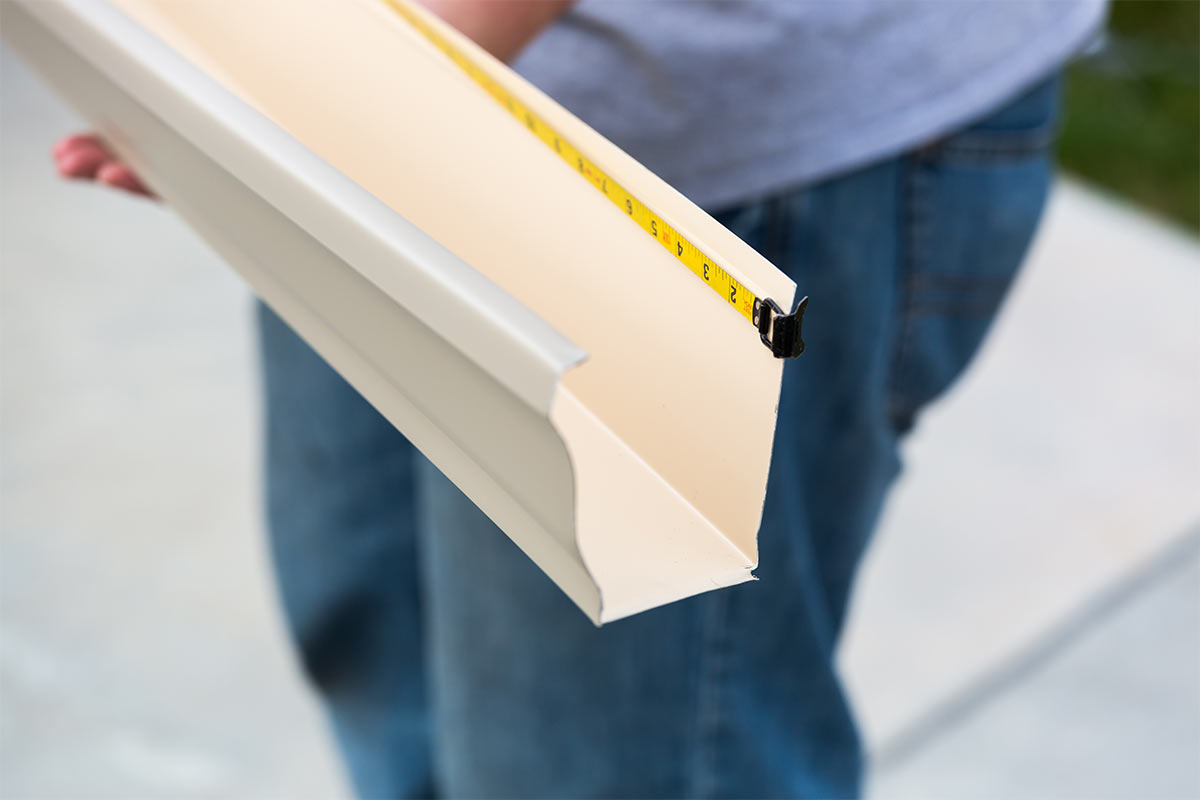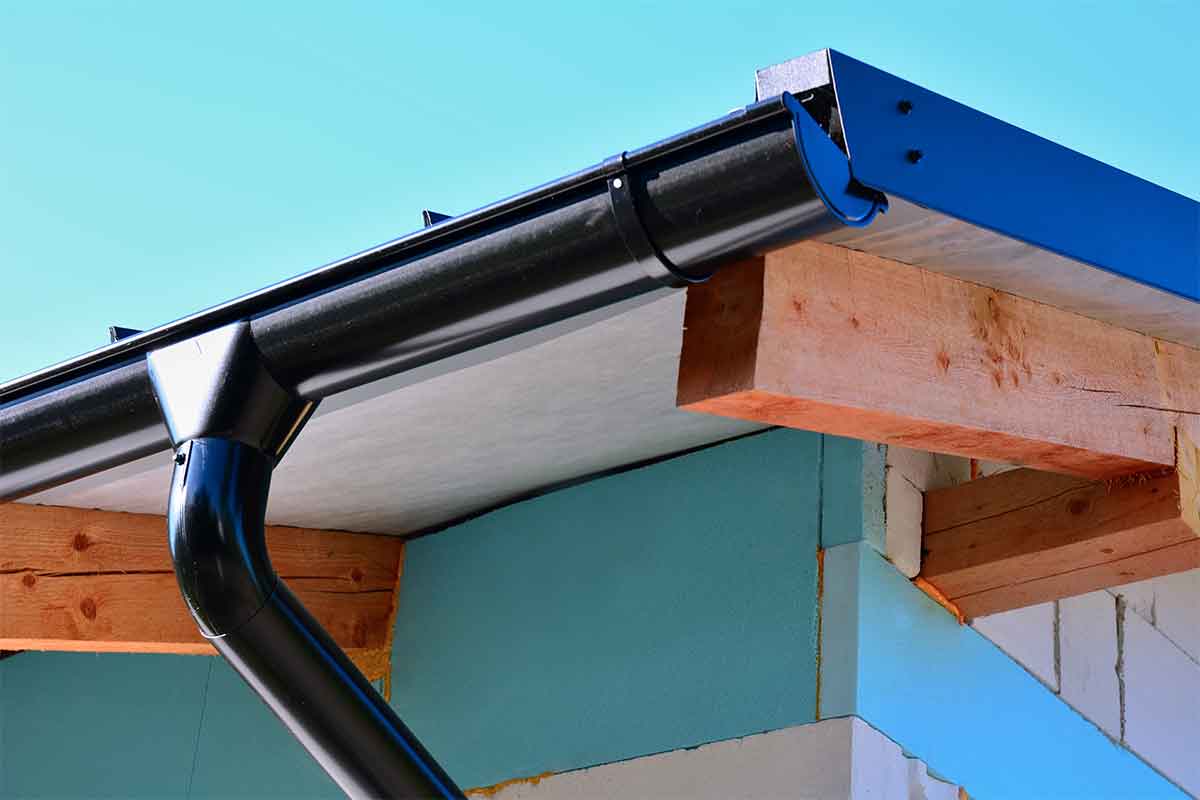Our companies are backed by the Best Pick Guarantee. Call one today!
Like so many other parts of your home’s exterior, gutters probably aren’t something you spend much time and energy pondering until something goes wrong. But when a storm knocks down a section of gutter or a clogged downspout sends gallons of rainwater into your basement, gutters are all you’ll be able to think about.
If you need new gutters (or if your home is gutterless and you’re starting from scratch), you have a few important decisions ahead of you.
Should you go with vinyl gutters? What about aluminum? Or will you spring for copper?
Ultimately, the gutter material you select will depend largely on your budget, but you should also consider your home’s architectural style and your personal taste.
Most importantly, your new gutters must function correctly. Poorly installed gutter systems won’t direct water away from your home’s foundation, which can quickly translate to disaster. Major (alternate translation: expensive) problems such as wood rot, foundation cracks, pest infestations, water damage, and soil erosion are all common occurrences when gutters don’t work the way they should.
Regardless of material, gutters are typically priced by the foot. This price can vary according to the material’s thickness, otherwise known as the gauge, as well as the size and shape of the gutter.
Ready to learn everything there is to know about gutter materials? Let’s go!
Aluminum Gutters
 Aluminum gutters are widely installed on homes today and with good reason. Their relatively low cost coupled with long-term strength makes them an ideal choice for many households. On average, aluminum gutters will last at least 20 years (and often longer) with consistent cleaning and maintenance.
Aluminum gutters are widely installed on homes today and with good reason. Their relatively low cost coupled with long-term strength makes them an ideal choice for many households. On average, aluminum gutters will last at least 20 years (and often longer) with consistent cleaning and maintenance.
Aluminum gutters are available in a variety of styles, sizes, and colors. While some aluminum gutters are installed in sections, many professionals will fashion seamless gutters on-site that are customized to your home’s specifications.
Advantages of aluminum gutters
- You can choose seamless gutters to avoid seam sealant reapplication over the years.
- Aluminum will not rust or thin over time.
- Compared to other metal gutter options, aluminum is on the lower end of the cost spectrum.
- Aluminum gutter installation is quick and straightforward.
- You’ll have plenty of factory-applied color options to complement your home’s exterior.
Disadvantages of aluminum gutters
- Aluminum is a relatively soft metal and is susceptible to dents and damage from ladders or falling limbs.
- Aluminum expands and contracts with temperature changes; extreme heat or cold can cause sections of gutter to split or tear.
- Low-gauge, thick aluminum will increase the total price of the project, but thicker metal is more durable.
- If you opt for sectional instead of seamless gutters, your contractor will need to reapply seam sealant periodically to prevent leaks.
- Since almost everything on the exterior of your house will weather over the years, plan to have the outside of your gutters cleaned and repainted at regular intervals.
If you’re looking for a low-maintenance, cost-effective gutter system with plenty of options for customization, ask your gutter installation contractor about aluminum gutters. Opt for thicker gauge metal to get the most bang for your buck, especially if you live in a part of the country that sees significant snowfall in the winter.
Copper Gutters
 Copper gutters are widely hailed as a stunning architectural feature to add to a home. Copper is a high-end gutter material not only because of its aesthetic appeal but also because of its durability: copper is very strong, and when they’re properly maintained, copper gutters will likely never need replacement.
Copper gutters are widely hailed as a stunning architectural feature to add to a home. Copper is a high-end gutter material not only because of its aesthetic appeal but also because of its durability: copper is very strong, and when they’re properly maintained, copper gutters will likely never need replacement.
Like aluminum gutters, copper gutters can be installed in sections or in a seamless design. To help you determine whether copper is the right material for your gutters, let’s explore some of the pros and cons of copper gutters:
Advantages of copper gutters
- Copper is a high-end, very durable gutter material that will beautify and add value to a home.
- Joints between sections are soldered during installation, which, along with consistent maintenance and cleaning, eliminates the need for periodic sealant application.
- Copper gutters are typically available as a seamless option.
Disadvantages of copper gutters
- Copper is at the highest end of the price spectrum for gutter materials.
- The market value of copper makes even your downspouts a target for thieves.
- The installation process is labor intensive, particularly if the gutters are installed in sections.
- The bright copper color will gradually weather to a characteristic green patina color (which isn’t necessarily a disadvantage, but certainly something to bear in mind).
Copper gutters are gorgeous, but be sure to work with a reliable, proven professional gutter installer. Remember to take the value of your home into account before you sign a contract.
If you’re planning to put your house on the market soon or have made other recent renovations to bring your home’s value into line with the rest of your neighborhood, you may find that your return on investment for copper gutters will be lower than you’d hoped. Consult a real estate expert and your gutter installer for the best advice.
Steel Gutters
 Steel gutters are known for their sturdiness and strength and are available in either a stainless or galvanized finish.
Steel gutters are known for their sturdiness and strength and are available in either a stainless or galvanized finish.
Stainless steel gutters are a relatively rare find, mostly due to their high costs. While they never rust and can maintain their sheen for years, the significant up-front investment can be a hard pill to swallow for many people.
Galvanized steel gutters are made from steel that has been coated with a thin layer of zinc, which strengthens the metal and makes it resistant to rust. Galvanized gutters typically last approximately two decades.
Advantages of galvanized steel gutters
- Galvanized steel is resistant to rust and outperforms aluminum in terms of resisting damage and thermal warping.
- Steel gutters can be installed in seamless runs.
Disadvantages of galvanized steel gutters
- The metal’s protective zinc layer will eventually wear off, making the gutters susceptible to rust.
- Detecting a deteriorating zinc coating isn’t easy; without periodic inspections, rust could go unnoticed for longer periods of time.
- Steel is a heavy metal, which can complicate the installation process.
Because galvanized steel and aluminum gutters are often sold at similar price points and are durable metals, you may end up choosing between the two. What galvanized gutters lack in rust resistance, they make up for in sturdiness.
Aluminum gutters, alternatively, are more susceptible to dents and bending but will never rust. Talking these options over with a gutter professional will help you choose the material that suits your home environment and needs best.
Vinyl Gutters
 Vinyl gutters are made from PVC and come in a variety of colors. Because they’re a relatively low-cost option and are often marketed as a simple DIY solution, the lure of the “I can totally put new gutters on my house in a weekend!” fallacy can be hard to resist.
Vinyl gutters are made from PVC and come in a variety of colors. Because they’re a relatively low-cost option and are often marketed as a simple DIY solution, the lure of the “I can totally put new gutters on my house in a weekend!” fallacy can be hard to resist.
Don’t succumb!
Between the heights involved in the average gutter installation, the equipment you’ll need to either purchase or rent, and the likelihood of damage to your house and your person, a DIY gutter installation project is just not a good idea.
Vinyl gutters typically last several decades and are a great choice for simple, easy-care home improvement. Protect your safety and the value of your home by having the pros take care of the installation.
Advantages of vinyl gutters
- Vinyl is a plastic that will not rust or rot.
- Vinyl gutters quietly redirect water in comparison to some metals that may create a more noticeable noise during rainstorms.
- Ideal for budget-conscious homeowners.
Disadvantages of vinyl gutters
- Vinyl can crack due to temperature fluctuations, particularly in colder climates.
- Without proper maintenance, leaks between sections can develop over time.
While vinyl isn’t as flashy as its metal counterparts, it is a durable material that can stand up to the wear and tear that gutters face in the line of duty. And remember: the best vinyl gutters are the ones you don’t install on your own.
The Bottom Line
You’re now equipped with the lowdown on gutter materials, but making the final decision takes time. Plan to consult a few gutter installation companies during your search, and be honest about your needs and your concerns. When it comes time to select a gutter material, you’ll need to think about budget, of course, but also about what makes the most sense for the architectural style of your home and your area’s climate.
Regardless of the gutter material you decide is best for your home, work with a knowledgeable gutter professional to ensure that your gutters do their job instead of causing more problems.
When you hire a Best Pick gutter installation expert, you’re truly getting the best of the best. All Best Pick companies are fully vetted on an annual basis—and that includes verification of all state-required licenses and insurance coverage.
We do the homework so you don’t have to, and we guarantee that you’ll be pleased with your experience working with a Best Pick.





















